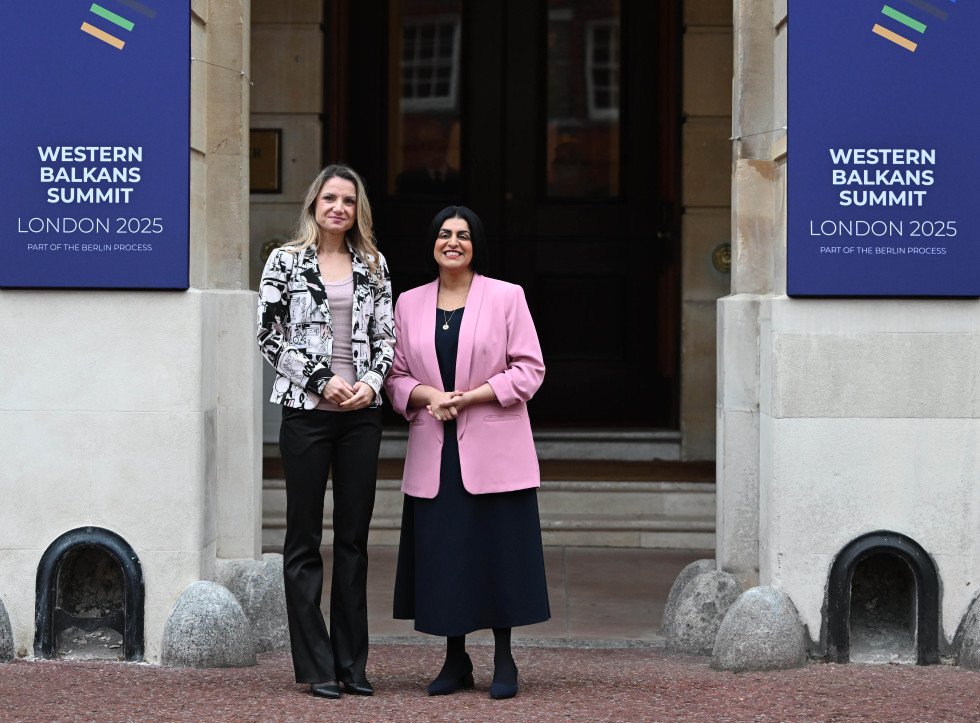The Berlin Process promoting Cooperation and advancing Efforts for a Safer Society

At the start of the Berlin Process conference of interior ministers | Author Parsons Media
The participants discussed ways to strengthen cooperation in the Western Balkans in addressing irregular migration and organised and serious crime.
For Slovenia, a coordinated and regional approach among the Berlin Process countries in the Western Balkans, as well as strong neighbourly cooperation, is of key importance. “Our measures must always be implemented in close partnership with the Western Balkan countries, in order to find effective and practical solutions to our shared challenges,” the State Secretary underlined at the conference.
She emphasised the need for coordinated action in the areas of border management, accelerated asylum procedures, combating migrant smuggling, enhancing cooperation on readmission and return, and aligning visa policies. In this context, she advocated for referring to the EU Action Plan on the Western Balkans and for identifying synergies with existing EU projects in the region. The State Secretary also called for stronger cooperation with Frontex and Europol, and for the effective use of the European Multidisciplinary Platform Against Criminal Threats (EMPACT).
Irregular migration in the region is facilitated by organised criminal networks that generate substantial profits through migrant smuggling and human trafficking. They use the same routes for other forms of illicit trade, such as drug and firearms smuggling. Slovenia values the support and activities of Europol, in particular the Operational Task Force (OTF) Zebra, which brings together law enforcement authorities from several Berlin Process members. As a good example of effective regional cooperation in addressing security risks in the region, the State Secretary highlighted the regular meetings of police chiefs within the Brdo Process, aimed at enhancing information exchange and police cooperation in the Western Balkans. She also noted that the Western Balkan partners are facing labour shortages and are therefore actively seeking workers beyond their borders. The State Secretary proposed that the region be supported in concluding labour mobility agreements with other countries, including protective measures to prevent abuses.
The conference also discussed the protection of girls and women in the digital environment and the broader efforts to build a safer society. Slovenia welcomes all initiatives aimed at protecting minors online through security mechanisms and innovative technological tools. In addition to technical solutions, it is essential to raise awareness about safe and responsible internet use. For Slovenia, the rapid and effective detection of child sexual abuse is crucial. Only by identifying such cases early can we prevent further harm to the child, ensure their protection, and provide them with appropriate professional support, while also ensuring that perpetrators are prosecuted in compliance with the law. Internet service providers play a key role in uncovering cases of child sexual abuse online, and preventive activities in this area are equally important. Law enforcement authorities must have access to effective tools, adequate legal frameworks, and operational mechanisms that allow them to effectively identify and bring to justice perpetrators of such heinous crimes.
Background
The Berlin Process was set up in 2014 with the aim of keeping EU enlargement to the Western Balkans high on the European agenda and maintaining positive reform momentum in the region through a variety of projects. Meetings of interior ministers within the Berlin Process have been held since 2018. They bring together ministers from EU partner countries, Western Balkan states, the United Kingdom, and the European Commission. The regular topics of these ministerial meetings include strengthening cooperation in the fields of security and migration management.

